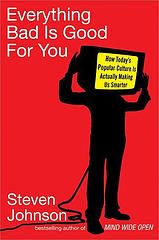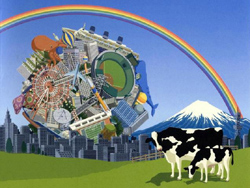first up: I appreciate you coming over to defend yourself. The blogosphere is far too often self-reinforcing – the left (for example) reads left-leaning blogs and the right reads right-leaning blogs & there’s not a lot of dialogue between people on opposite sides, to everyone’s loss.
Here’s something that’s been nagging me for the past week or so: your book seems to effectively be conservative. Bear with me for a bit: I’m not saying that it’s Bill O’Reilly-style invective. I do think, however, that it effectively reinforces the status quo. Would I be wrong in taking away as the message of the book the chain of logic that:
- Our pop culture’s making us smarter.
- Therefore it must be good.
- Therefore we don’t need to change what we’re doing.
I’ll wager that you wouldn’t sign off on (3) & would argue that your book isn’t in the business of prescribing further action. I’m not accusing you of having malicious intentions, and we can’t entirely blame a writer for the distortions we bring to their work as readers (hey Nietzsche!). But I think (3)’s implicitly in the book: this is certainly the message most reviewers, at least, seem to be taking away from the book. Certainly you offer caveats (if the kids are watching television, there’s good television & there’s bad television), but I think this is ultimately a Panglossian view of the world: everything is getting better and better, we just need to stand back and let pop culture work upon us. Granted, the title may be a joke, but can you really expect us, the attention-deficit-addled masses, to realize that?
Even to get to (2) in that chain of reasoning, you need to buy into (1), which I don’t know that I do. Even before you can prove that rising intelligence is linked to the increased complexity of popular culture – which I’ll agree is interesting & does invite scrunity – you need to make the argument that intelligence is something that can be measured in a meaningful way. Entirely coincidentally – really – I happened to re-read Stephen Jay Gould’s Mismeasure of Man before starting in on EBIGFY; not, as I’m sure you know, a happy combination, but I think a relevant one. Not to reopen the internecine warfare of the Harvard evolutionary biology department in the 1990s, but I think the argument that Gould wrings out of the morass of intelligence/IQ studies still holds: if you know who your “smart” kids are, you can define “smartness” in their favor. There remain severe misgivings about the concept of g, which you skirt: I’m not an expert on the current state of thought on IQ, so I’ll skirt this too. But I do think it’s worth noting that while you’re not coming to Murray & Herrnstein’s racist conclusions, you’re still making use of the same data & methodology they used for The Bell Curve, the same data & methodology that Gould persuasively argued was fundamentally flawed. Science, the history of intelligence testing sadly proves, doesn’t exist outside of a political and economic context.
But even if smartness can be measured as an abstract quantity and if we are “smarter” than those of times past, to what end? This is the phrase I found myself writing over and over in the margin of your book. Is there a concrete result in this world of our being better at standardized tests? Sure, it’s interesting that we seem to be smarter, but what does that mean for us? Maybe the weakest part of your book argues that we’re now able to do a better job of picking political leaders. Are you living in the same country I’m living in? and watching the same elections? If we get any smarter, we’ll all be done for.
I’ll grant that you didn’t have political intentions in writing this, but the ramifications are there, and need to be explored if we’re going to seriously engage with your ideas. Technology – the application of science to the world in which we live – can’t exist in an economic and political vacuum.



 the following is slightly edited analysis of the game by rylish moeller, an english prof who is very active on the
the following is slightly edited analysis of the game by rylish moeller, an english prof who is very active on the